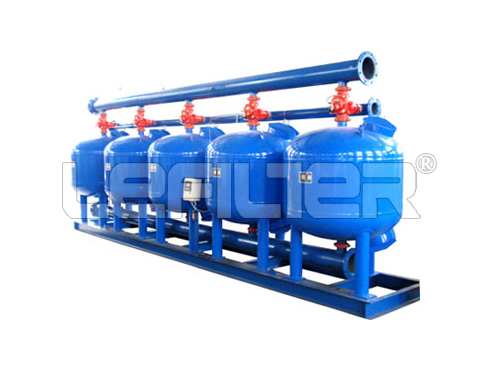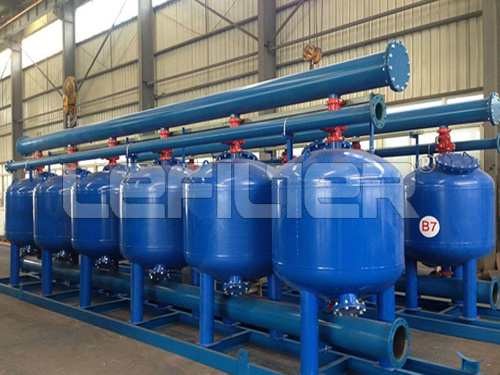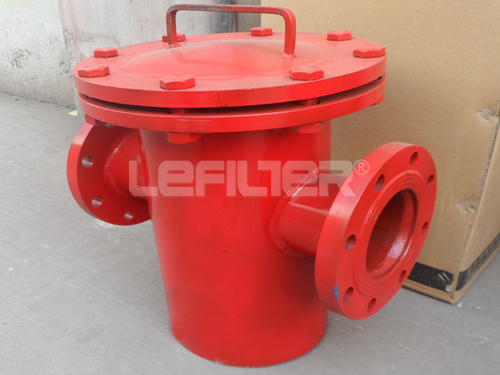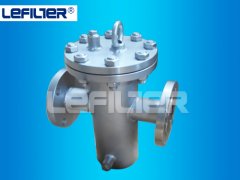1. Advantages of large flow water filters
(1) High efficiency filtering capacity
Large flow water filters can handle large amounts of water flow, and their filtering accuracy is usually high, which can effectively remove various impurities in the water, such as silt, rust, suspended matter, organic matter, etc. This is essential for ensuring water quality, protecting subsequent water treatment equipment, and the normal operation of water-using equipment. For example, in industrial production, high-purity water is a key requirement for many process processes, and large flow water filters can ensure that the water entering the production system meets the quality standards.
Advanced filtering technology and materials are used to make the filtering effect more stable and reliable. Some large flow water filters use a multi-layer filtering structure, including a coarse filter layer, a fine filter layer, and an activated carbon layer, which can filter pollutants of different sizes and properties step by step, thereby improving the filtering efficiency. At the same time, high-quality filter element materials have a large filtering area and good adsorption performance, and can maintain efficient filtering effects for a long time.
(2) Large flow processing capacity
For occasions that require a large amount of water, such as large factories, commercial buildings, municipal water supply systems, etc., large flow water filters can meet their high flow requirements. Compared with traditional small-flow filters, large-flow water filters can reduce the number of equipment and floor space, and reduce installation and maintenance costs. For example, in the water supply system of a large industrial park, the use of large-flow water filters can centrally process a large amount of industrial water, avoid the scattered installation and management of multiple small filters, and improve the operating efficiency of the system.
Able to adapt to different flow changes. In actual applications, water flow may fluctuate with production demand, seasonal changes or other factors. Large-flow water filters usually have good flow regulation capabilities and can automatically adjust the filtration parameters within a certain range to ensure that good filtration effects can be maintained at different flow rates. This flexibility enables large-flow water filters to play a stable role in various complex water use environments.

(3) Long service life
The filter element of large-flow water filters is usually made of high-strength, corrosion-resistant materials and has a long service life. This not only reduces the frequency of filter element replacement and reduces maintenance costs, but also reduces equipment downtime caused by filter element replacement and improves production efficiency. For example, some high-quality filter element materials can continue to work for thousands of hours or even longer under harsh water conditions, greatly reducing the user's use cost.
Some large-flow water filters are also equipped with intelligent control systems, which can monitor the use and filtering effect of the filter element in real time. When the filter element reaches its service life or the filtering effect decreases, the system will automatically sound an alarm to remind the user to replace the filter element in time. This intelligent management method further improves the service life and reliability of the filter.
(4) Low pressure loss
Large-flow water filters are usually designed to reduce pressure loss to ensure that water can flow smoothly through the filter. Low pressure loss means that the filter has less impact on the pressure of the water supply system, and the installation of the filter will not cause insufficient water supply pressure. This is especially important for some occasions with high water pressure requirements, such as high-rise buildings and fire protection systems.
The use of reasonable filtering structure and fluid mechanics design can effectively reduce the resistance of water flow inside the filter and reduce pressure loss. For example, some large-flow water filters adopt streamlined inlet and outlet design and internal channel layout, so that water can flow smoothly through the filter, reducing eddy currents and local resistance, thereby reducing pressure loss.
(5) Easy operation and convenient maintenance
Large-flow water filters usually have a simple and easy-to-understand operation interface and control system, and users can easily perform operations such as parameter setting, operation monitoring and fault diagnosis. Even non-professionals can easily master the use of filters. For example, some high-flow water filters are equipped with a touch screen control panel, which allows users to operate through an intuitive graphical interface, greatly improving the convenience of use.
Maintenance is also relatively simple. The replacement of the filter element can usually be completed in a short time without the need for complex tools and professional skills. At the same time, some high-flow water filters also have a self-cleaning function, which can automatically remove impurities on the filter element during operation, reducing the frequency and workload of manual cleaning. In addition, the outer shell and internal structure of the filter are usually made of corrosion-resistant and easy-to-clean materials, which is convenient for daily cleaning and maintenance.

2. Disadvantages of high-flow water filters
(1) High initial investment cost
Due to the complex structure and high manufacturing process requirements of high-flow water filters, the equipment price is relatively high. In particular, some high-end products using advanced filtering technology and materials are even more expensive. This may be a greater burden for some small businesses or projects with limited budgets. For example, in some small factories or rural water supply projects, due to limited funds, they may not be able to afford the high cost of high-flow water filters, and choose lower-priced traditional filtering equipment.
The installation of a large-flow water filter usually requires certain engineering modifications and supporting facilities construction, which will also increase the initial investment cost. For example, it is necessary to provide the filter with suitable installation space, connecting pipes and power supplies, etc., which all require certain expenses. In addition, if the original water supply system cannot meet the requirements of the large-flow water filter, it may also be necessary to upgrade the water supply system, further increasing the cost.
(2) High operating cost
The large-flow water filter needs to consume a certain amount of energy during operation, such as electricity, compressed air, etc. In particular, some filters with automatic cleaning functions or intelligent control systems have relatively high energy consumption. This will increase the user's operating costs, especially for large-scale water treatment systems that operate for a long time, energy costs may be a considerable expense.
The replacement of the filter element is also an important operating cost. Although the filter element of the large-flow water filter has a relatively long service life, as the filtering time increases, the filter element will gradually become clogged, the filtering effect will decrease, and the filter element needs to be replaced in time. The price of the filter element is usually high, and the price difference between different types of filter elements is large. In addition, the replacement of the filter element requires professional operation, which will also incur certain labor costs.
(3) High requirements for water quality
Large flow water filters have certain requirements for the quality of incoming water. If the incoming water quality is too poor and contains a large amount of pollutants such as silt, rust, and organic matter, it may cause the filter's filtering effect to decline, the filter element to become clogged faster, and even damage the filter. Therefore, before using a large flow water filter, it is usually necessary to pre-treat the incoming water to reduce the content of pollutants in the water and meet the filter's water inlet requirements.
Different types of large flow water filters have different adaptability to water quality. For example, some filters are suitable for treating relatively clean water sources, while for water sources containing high concentrations of organic matter or heavy metals, special filtering technology and materials may be required, which will increase the difficulty and cost of selecting filters.

(4) Large size and more space
Large flow water filters are usually large in size and require a certain amount of space. For some occasions with limited space, such as small factories and commercial buildings, there may be a problem of insufficient installation space. In addition, the installation location of the large filter also needs to be considered for ease of maintenance and operation, which may further limit the choice of its installation location.
In some already built water supply systems, installing a large flow water filter may require large-scale renovation and expansion, which will not only increase costs, but may also affect the normal operation of the system. Therefore, when choosing a large flow water filter, you need to fully consider its installation space and the impact on the existing system.
Other Related Products:
High Flow Cartridge Filter
Basket filter
High flow filter element
{sval:sql sql='SELECT n_parameter FROM dede_addonarticle WHERE aid = ~aid~ ' } {/sval:sql}
{sval:sql sql='SELECT n_parameter FROM dede_addonarticle WHERE aid = ~aid~ ' } {/sval:sql}






















